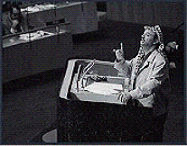
It has been exactly one year since Abu Ammar, (or President Yasser Arafat, or, most correctly, Muhammad Abdul Raouf Arafat al-Qudwa al-Husseini), died, leaving bereft and orphaned a nation of stateless Palestinians whose cause he personified and promoted as no one else did. Shortly before his death he was asked by a journalist about his greatest achievement, and he had replied, flashing his trademark face-splitting grin: “We have made the Palestinian case the biggest problem in the world. (…) One hundred and seven years after the Basel Conference, 90 years after the Sykes-Picot Agreement, Israel has failed to wipe us out. We are here, in Palestine, facing them. We are not Red Indians.”
One year after his death, the Palestinian “case” remains one of the biggest problems in the world, and despite their receding hopes of viable statehood in the West Bank and Gaza, Palestinians still consider, almost to a man, Abu Ammar to have been the person most responsible for making it so. Most continue to think of him as the father of the Palestinian nation, and around the world the obituaries that reported and reflected upon his death referred to him glibly, if not inaccurately, as “Mr. Palestine.”
Indeed, while Palestinians remain divided today about some of the pivotal choices he made (at Amman, at Beirut, at Algiers, at Oslo, at Gaza, at Camp David, and, finally, in Ramallah), and about the style and methods of his leadership, there is near-unanimity on the question of his legacy: ask the Palestinian on the street, on any street in the world, and you will be told, without hesitation, that Abu Ammar single-handedly transformed the Palestinian issue from one of providing humanitarian relief to scattered, war-scarred refugees to that of the enduring political struggle of a nation fighting for – and deserving of – self-determination through statehood. You will be told, further, that Arafat united the fractured Palestinian refugee community; that he transformed the PLO (which was created by the Arab states to contain and control Palestinian political groups) into an umbrella organization for Palestinian nationalism; that he earned the right for the Palestinians to represent themselves in the court of international opinion; and, above all, that he achieved, through a combination of extraordinarily unconventional means, a lasting international legitimacy for his cause.
It is not hard to see, today, why Arafat was so loved, not just by his own people but by the Arab masses in general: he was a people’s leader in the fullest sense of the word, who always managed to demonstrate, despite the actual entrenched autocracy of his political methods, an instinctive sensitivity to the mood and sentiments of his people. In a region marked by military dictatorships and detached, elitist monarchs, his simple populist slogans of armed struggle, people’s resistance, democratic secularism - cloaked, as they were, in the mystique and theatrical symbolism of guerrilla warfare - captured the popular imagination and lent him a legitimacy that no other leader in the region, whether democratically elected or not, could muster. The white-and-black peasant’s kuffiyeh (deliberately worn to conjure memories of the first Palestinian peasant’s revolt against British and Zionist colonialism in the mid-30s); the shabby army greatcoat (which he claimed he would only take off once Palestine was liberated); the simple meals and austere lifestyle; the constant cheek-kissing and hand-waving and hugging and reaching out to the masses – all these were the carefully-chosen elements that constituted, despite his less-than-riveting public speeches, Arafat’s inimitable personal charisma. The thousands of Palestinians who braved military checkpoints and thwarted Israeli travel restrictions to flock to the Muqata to bid farewell and to give him an emotion-charged “people’s funeral” last year - the sort of which has rarely been seen in the Arab world since the death of Nasser - proved more convincingly than could any journalistic or academic account the worth of the man’s life.
However, one year after Arafat’s death, it is doubtful if the dream of Palestinian statehood is any closer to reality than it was all those years ago, when Arafat first appeared at the UN (in 1974) and memorably declared that he had come to court the international community with “a gun in one hand and an olive branch in the other,” and begged his audience to not let “the olive branch fall.”
While columnists around the world had predicted that his death, and the subsequent taking-up of the mantle by Abu Mazen, would open up a new peace process that would rapidly result in a Palestinian state, the facts on the ground today are more than discouraging. The Israelis have once again declared that they have “no partner for peace” while they continue with an endless series of policies - settlement expansion, apartheid-like road separation, property confiscation, separation wall, checkpoints, barriers, fences, incursions, targeted killings, house demolitions – that seem calculated to destroy even the feeblest hopes for a viable, non-cantonised Palestinian state. Meanwhile, on the Palestinian side, Fatah remains as close to the verge of collapse as it was last year; the security forces remain fragmented and bent on internecine skirmishes; Hamas, while it has come a considerable distance, remains, for the moment, opposed to the PLO and officially, at least, opposed to the two-state solution; and the Palestinian people remain impoverished, powerless, seething, humiliated, veering closer towards Islamicism than ever before in their history, and, most tragic of all, stateless.
It has been exactly a year since Abu Ammar died, and the Palestinians do not yet know how the father of their nation died and they do not yet know how they are to live. In any reckoning of Arafat’s life and legacy, there must always, no matter what, be this: he may have been instrumental in making the Palestinian case the “biggest problem in the world,” but it is a problem that has yet to be proven solvable.



